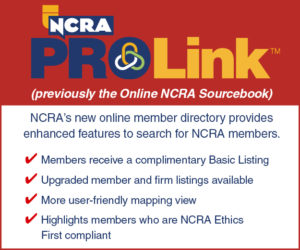By Ariel I. Rayman
Before I entered the court reporting industry, I was a practicing attorney. My experience with court reporters was mixed. Some were outstanding and others would show up late, frazzled, unprepared for the proceeding, or worse. For an attorney, the relationship with the court reporter and agency should be seamless. Attorneys expect their court reporters to be punctual, presentable, professional, and polished. If the reporter fails to meet any of these standards, it is highly unlikely the agency — let alone the court reporter — will be requested again. Attorneys and firms typically request the same reporter and agency because attorneys like consistency.
By following these seven steps, you will not only be doing your part in upholding professionalism for the industry, but you will ensure repeat business:
- Tardiness/no-shows: Nothing will frustrate a room full of attorneys more than being late or failing to appear for a deposition. Make sure you know where you are going and how you are going to get there, and manage your schedule. If you are unable to make it or you anticipate you will be late, notify your agency immediately.
- Take charge: You are the neutral party in the room, and you can remind everyone in the room that your job is to accurately preserve a word-for-word transcript, therefore everyone in the room needs to listen to your instructions. If an attorney or witness is talking over someone, say something. If an attorney is being rude or unprofessional, say something. If an attorney is speaking too fast or is reading from a piece of paper, it is perfectly acceptable to remind the speaker to slow down. If an attorney is going through exhibits, make sure you mark them and tell the attorney to slow down to allow yourself time to properly label each exhibit so you are not labeling as the witness or attorney is speaking. But please, this is not a license to complain; rather it is an opportunity for you to take charge of the deposition from the beginning.
- Control your emotions: A court reporter is tasked with preserving the record in a fair and impartial manner. Sensitive topics may be discussed that can be very emotional to the parties and/or the witness. As a court reporter, you must remain neutral while preserving the record. It is unprofessional, not to mention distracting, if you show emotion during a deposition. Please be aware that everyone in the room can hear you laugh and see you cry. Controlling your emotions and your body language is one of the many keys to being an exceptional court reporter.
- Do not eat during a proceeding: Before the deposition commences, it may be in your best interest to ask if it will run through the lunch hour. If so, be prepared and eat beforehand. If you have an absolute need or a medical condition (i.e., hypoglycemia), then let the attorneys know in advance that you may need to eat a small snack during the deposition. Also, you can remind attorneys that a short 15-minute break during the course of a deposition is good for everyone.
- Mobile phones/PDAs: Depositions can be dry and a bit dull, but do not be tempted to surf the web or do other tasks. Even if you are an expert at multi-tasking, checking your mobile phone or playing with your PDA shows you are not paying full attention and gives the impression that you are not accurately transcribing what is being said.
- Technology: It is imperative that you have technology that not only looks like it is from this generation but also functions properly. Time is precious to you and all parties involved. Waiting for a computer to reboot, load, or update is frustrating for all.
- Sloppy transcripts: Deposition content can be technical in nature. If it is a medical malpractice, intellectual property, pharmaceutical matter, or any other highly specialized topic, you will be faced with numerous acronyms and unusual terms. You can always ask for a spreadsheet of terms to ensure accuracy — especially if a party wants a rough draft or next-day delivery. Study and familiarize yourself with these terms and pay close attention to what is being said. Do not rush to finish a job. You should put care into your work and take time to research terms and abbreviations that are new to you. Attorneys read and rely on your transcript, and they need to be assured that the record is properly preserved.
This is not an exhaustive list, but if you follow these simple tips, it will make your job easier and the attorneys will appreciate you and request you again for future depositions.
Ariel Rayman, Esq., is the executive director of Alderson Court Reporting. He can be reached at ariel.rayman@aldersonreporting.










